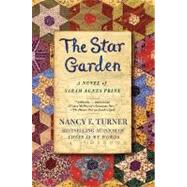
Nancy E. Turner was born in Dallas, Texas, and currently lives with her husband, John, in Tucson, Arizona. She started college when her children were grown and completed a bachelor’s degree in fine arts at the University of Arizona. The Star Garden is her third novel in the Sarah Agnes Prine series, which is based on family stories about Nancy’s own great-grandmother; previous titles include Sarah’s Quilt and the bestselling These Is My Words.
The New copy of this book will include any supplemental materials advertised. Please check the title of the book to determine if it should include any access cards, study guides, lab manuals, CDs, etc.
The Used, Rental and eBook copies of this book are not guaranteed to include any supplemental materials. Typically, only the book itself is included. This is true even if the title states it includes any access cards, study guides, lab manuals, CDs, etc.
Excerpted from The Star Garden: A Novel of Sarah Agnes Prine by Nancy E. Turner
All rights reserved by the original copyright owners. Excerpts are provided for display purposes only and may not be reproduced, reprinted or distributed without the written permission of the publisher.